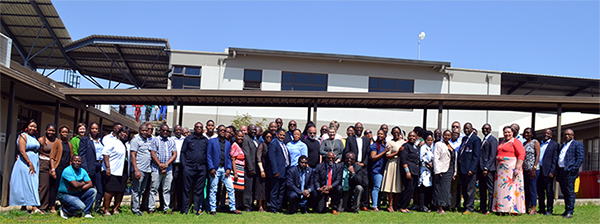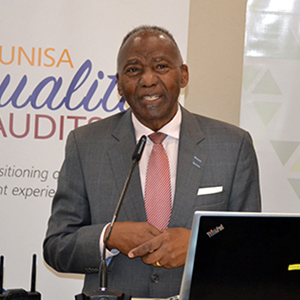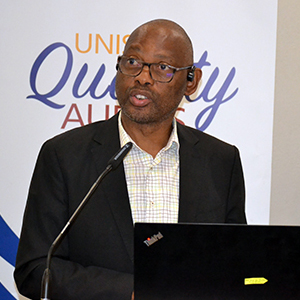News & Media
Intensifying teaching and learning practice in African universities
Graced by renowned higher education experts in Africa, the 2nd Regional Model Symposium hosted by Unisa, in partnership with the Namibian College of Open Learning (NAMCOL) and the Botswana Open University (BOU), aimed at enhancing the quality and credibility of programme offerings and learner support services within a context-bound regional model. Among others, the event also enabled these institutions to interrogate the African universities’ teaching and learning strategies for the inclusion, equity and social justice of especially marginalised communities using a regional model system.

Distinguished delegates at the Namibia Regional Model Symposium
Themed “Leveraging technology to mediate student support, teaching, learning and assessment: Lessons for an evolving higher education”, the symposium was hosted at NAMCOL in Windhoek, Namibia. Established in 1994, NAMCOL is a state-owned education institution that provides access to education to thousands of students through its secondary education and tertiary level programmes. Previously known as Botswana College of Distance and Open Learning, BOU transformed to a university in 2017 and is mandated to enable education accessible to Botswana citizens, especially for the dropout youth and adults through open and distance learning (ODL) methodology.
Envisioning the Africa we want through education institutions
Providing the symposium’s overview on day one, 4 October 2023, Prof Lumkile Lalendle, Unisa's Executive Director of Quality Assurance and Enhancement, recalled that open universities previously targeted the working class to provide them with the necessary skills for the work environment. He added: "Our context has changed as we now have the younger generation enrolling at these institutions due to their social and economic challenges." Lalendle maintained that the symposium focused on, among others, reclaiming Africa’s intellectual capital relating to how research embedded with the knowledge system in order to recognise the identity of education institutions and how they envision the Africa they want.

From left: Prof Lumkile Lalendle, Unisa's Executive Director of Quality Assurance and Enhancement; Dr Heroldt Murangi, NAMCOL’S Chief Executive Officer; and Dr Godson Gatsha, BOU’s Deputy Vice-Chancellor of Student Services
Setting the tone in his welcome address, Dr Heroldt Murangi, NAMCOL’S Chief Executive Officer, maintained that the use of technology was integral to the teaching and learning process, and he urged institutions of higher learning to embrace it to achieve an enhanced education offering.
He continued: "It is the task of education providers to maintain the momentum of this activity for the progressive growth of their countries and to ascertain the achievement of our respective national development goals." Murangi further encouraged these institutions to deliver on the promise of Ubuntu in order to safeguard their nations and to lay the foundation of improved education delivery.

The Hon Prof Peter Katjavivi, Namibian Speaker of the National Assembly
Speaking on "Human resource development for a Fourth Industrial Revolution (4IR) driven economy", the Honourable Prof Peter Katjavivi, Namibian Speaker of the National Assembly, affirmed that the gathering symbolised the commitment to intensify knowledge, discovery and collaboration. Katjavivi further added that open universities were important in offering accessible quality education and fostering innovations.
He remarked: "As institutions of higher learning, we should draw from each other and be open to external ideas instead of being narrowly defined institutions. Together, we can achieve greater milestones."
Promoting equitable access to quality and relevant education
Keynote speaker, Prof Khehla Ndlovu, Unisa’s Vice-Principal: Strategy, Risk and Advisory Services, spoke on "Locating Unisa’s regional model in its strategy for international collaborations". He mentioned that Unisa celebrated its 150 years of serving humanity, and that it was critical for it to reorient itself to provide education services to students with varying profiles. Speaking on the Southern African Development Community’s (SADC’s) 2022-2030 Regional Open and Distance Learning Strategic Plan, Ndlovu emphasised that the plan was important for Unisa as it noted the outcomes that needed to be considered in the context of lifelong learning, including enhanced equitable access to quality and relevant education, and enhanced skills for the regional industrialisation.

Prof Khehla Ndlovu, Unisa’s Vice-Principal: Strategy, Risk and Advisory Services
For Ndlovu, the collective effort of higher education institutions embraced lifelong learning with the intention to ensure collaboration by building on their established needs. "We need to look at sharing practices in teaching and learning and community engagement, which are redefined in terms of engaged scholarship," he remarked.
Ndlovu added: "Together, we should promote innovative thinking." Therefore, Ndlovu also acknowledged that the outcome of the engagement will further lead to an enhanced community of practice. He further stated: "Regional offices of these institutions are not post offices, but centres of learning. The community of practice must enable universities to shape student support in different areas."
Speaking about increasing access to quality higher education, Ndlovu continued: "We must assist our countries and institutions to have policies that can ensure that the underprivileged are also provided with opportunities."
Robust discussions on student support
Presenting on "Reclaiming African futures through research and collaboration among African universities to harness the 4IR promise", University of Namibia’s (UNAM’s) Vice-Chancellor, Prof Kenneth Matengu, reiterated that research conducted by universities must be impactful and respond to societal needs. In response, Prof Sifiso Nyathi, Namibia University of Science and Technology’s Registrar, asserted that technology must be taught differently at higher education institutions to empower young Africans to add value to other students who graduate elsewhere.
Further, Prof Romeela Mohee, Mauritius’ Higher Education Commissioner, focused on "Policy shifts in higher education for online and lifelong learning". Mohee noted that the key priorities of open universities included optimising technology and ODL, promoting inclusivity, enhancing quality assurance, and expanding and strengthening research activities.

From left: Prof Kenneth Matengu, UNAM Vice-Chancellor; Prof Sifiso Nyathi, Namibia University of Science and Technology Registrar; and Dr Karin McGuirk, Unisa College of Human Sciences’ Senior Lecturer
In response, Unisa College of Human Sciences’ Senior Lecturer, Dr Karin McGuirk, noted that relating to competency-based education, disruptive technologies require ‘disruptive’ education; therefore, she remarked that technology must be affordable, accessible and personalised as it leads to efficient student outcome.
Accomplished panellists from various African higher learning institutions also had robust engagements on "Higher education policies and graduates’ employability", and on "Reflections on quality assurance of online assessments and student support in the regional model".
Other thought-provoking presentations were delivered by Dr Maggy Beukes-Amiss, UNAM’s Director of the Centre for Innovation in Learning and Teaching, and Dr Alice Mkuzangwe, Unisa’s Director of Student Admission and Registration. They, respectively, focused on "Re-thinking online assessment strategies, experiences and challenges from a management perspective in higher education institutions" and "Fostering openness in ODL through a lens of student support to marginalised student populations".
In closing, Dr Godson Gatsha, BOU’s Deputy Vice-Chancellor of Student Services, emphasised that student voices were essential in curriculum development, adding that academic dishonesty must be combatted urgently as it compromises open and distance e-learning.
#Unisa150
* By Nancy Legodi, Acting Senior Journalist, Department of Institutional Advancement
Publish date: 2023/10/05

 Unisa co-hosts G20 community outreach in the Eastern Cape
Unisa co-hosts G20 community outreach in the Eastern Cape
 Unisans gain membership of prestigious science academies
Unisans gain membership of prestigious science academies
 Advocating for disability transformation through servant leadership
Advocating for disability transformation through servant leadership
 Unisa Press continues to illuminate the publishing space
Unisa Press continues to illuminate the publishing space